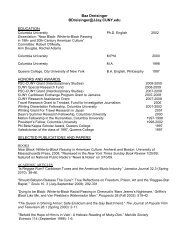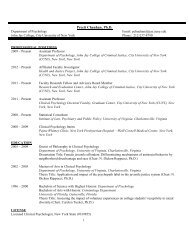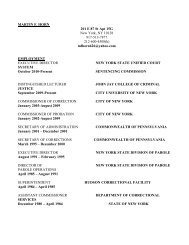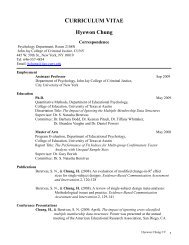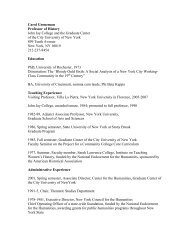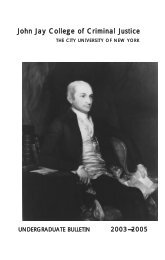Bulletin - John Jay College Of Criminal Justice - CUNY
Bulletin - John Jay College Of Criminal Justice - CUNY
Bulletin - John Jay College Of Criminal Justice - CUNY
You also want an ePaper? Increase the reach of your titles
YUMPU automatically turns print PDFs into web optimized ePapers that Google loves.
Courses <strong>Of</strong>fered<br />
CSL 235 Theories and Interventions of Human<br />
Services Counseling<br />
3 hours, 3 credits<br />
This course provides an overview of the history, theory, and<br />
methodology of human services counseling. The course focuses on<br />
the theories and interventions that have become commonplace when<br />
working with individuals, families, groups and organizations within<br />
the human services realm. Students will be introduced to the<br />
principles of risk and needs assessment, stress and emergency<br />
management, resource management, and individual and community<br />
advocacy in order to interface with government, private, and nonprofit<br />
social service agencies. Case examples and excerpts will be<br />
used to illustrate the principles of human service intervention and to<br />
expose students to what professionals in the field may say, do, and<br />
think when working with diverse client populations and<br />
organizations.<br />
Prerequisites: ENG 101, PSY 101, and CSL 150 or permission of the<br />
instructor<br />
CSL 331 Assessment and Clinical Evaluation in<br />
Chemical Dependency Counseling<br />
(Same course as PSY 331)<br />
3 hours, 3 credits<br />
This course will focus on assessment of addictive disorders, and<br />
clinical evaluation of substance and alcohol abusers. Application of<br />
assessment and clinical evaluation findings will be made to treatment<br />
planning, case management, discharge planning and clinical record<br />
keeping. These assessment and evaluation methods and findings will<br />
be applied to chemical dependency counseling techniques. While<br />
this course is intended for Addiction Studies Program (ASP) students,<br />
who are pursuing their Credential in Alcoholism and Substance<br />
Abuse Counseling (CASAC), other students with an interest in<br />
assessment and clinical evaluation in chemical dependency are<br />
invited to enroll.<br />
Prerequisites: ENG 102 or ENG 201, and PSY 266, and PSY 268<br />
CSL 342 Introduction to Counseling Psychology<br />
(Same course as PSY 342)<br />
3 hours, 3 credits<br />
Provides a theoretical survey of the field of counseling. Major<br />
emphasis is on such topics as ethical considerations, the intake<br />
interview, counselor roles and client roles, goals of counseling,<br />
referrals and liaisons in community, vocational counseling, tests and<br />
instruments used in the counseling process, academic counseling and<br />
research on the counseling process. Differences between counseling<br />
and psychotherapy are discussed. Field trips to various counseling<br />
centers are arranged.<br />
Prerequisites: ENG 102 or ENG 201, PSY 242, and PSY 243<br />
CSL 350 Advanced Topics in Chemical Dependency<br />
Counseling (Same course as PSY 350)<br />
3 hours, 3 credits<br />
This course provides instruction in specific counseling concepts and<br />
skills focused upon alcoholism and substance abuse counseling.<br />
Students learn about client assessment, treatment planning, case<br />
management, clinical record keeping, discharge planning, counseling<br />
roles and settings, family and community education, and vocational<br />
counseling.<br />
Prerequisites: ENG 102 or ENG 201, and PSY 266, PSY 268 and<br />
CSL/PSY 331<br />
CSL 360 Counseling in Gender and Work Life<br />
3 hours, 3 credits<br />
In this course, students will explore the meanings of gender, race,<br />
ethnicity, class and sexual orientation, and their role in vocational<br />
development and career choice. We will address how the formal and<br />
informal types of social control associated with these categories<br />
operate in psychological development, vocational choice, and the<br />
workplace. This course is interdisciplinary, so articles from a variety<br />
of disciplines including counseling, psychology, economics,<br />
sociology and anthropology will be read to better understand the<br />
69



